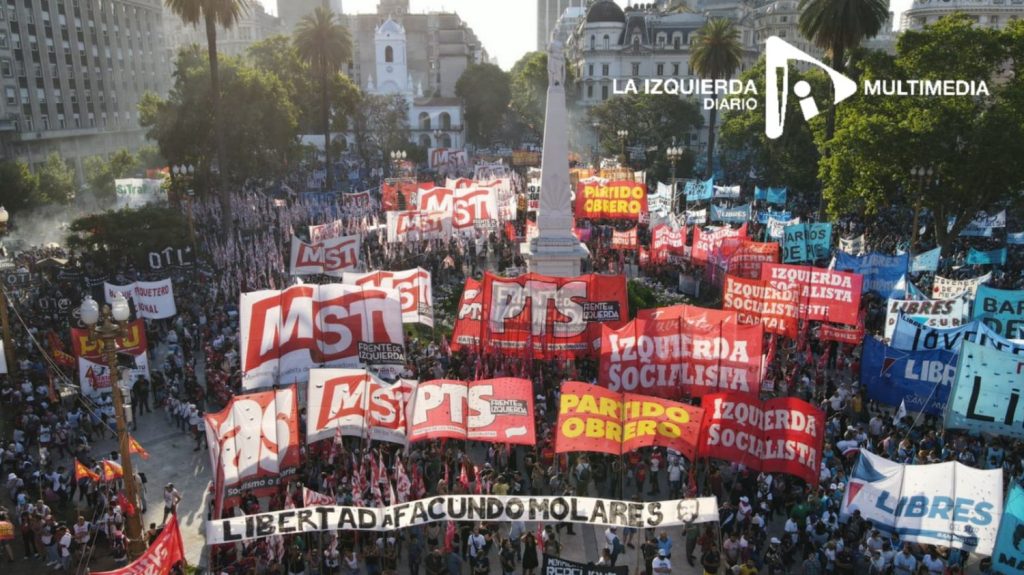By Izquierda Internacional
Sections of II: Left Party (US), OIR (Argentina), Ecosocialsts Bolivia, Agrupacion Marxista (Bolivia), Socialismo o extinción! (Mexico)
Revolutionary Trotskyism takes a stance on the upcoming general elections, the competing candidates and parties, the programs, and the country’s current situation. We observe a shift towards the right, inter-imperialist competition, and the emergence of Nazi-fascism. Who do we vote for?
On October 22, presidential elections will be held in Argentina. These elections occur amid a severe economic crisis marked by high unemployment, informal employment, soaring inflation, low wages, the oppression of indigenous peoples, the betrayal of trade union bureaucracies, the exploitation of the country by the two imperialist blocs—the US-Europe and China-Russia-BRICS—and the suppression of social protests.
Five presidential candidates and candidate blocs are participating in the general election. Among these, one, led by Sergio Massa, represents Peronism in power and its allies, united under Unión por la Patria (UP), which advocates a right-wing agenda. Massa, the presidential candidate, is often viewed as closely connected to the US Embassy. At the same time, much of his coalition, Kirchnerism, is pro-China. Most of the trade union bureaucracy supports this ticket.
Alternatively, there are three other bourgeois candidates and one from the reformist left.
One is led by Patricia Bullrich of Juntos Por El Cambio – PRO, positioned to the government’s right, focusing its campaign on the “iron fist” against crime and social protests. It is generally associated with Macrismo, which governed under Mauricio Macri and enjoyed the support of big business interests in agriculture and the bulk of the forces of oppression.
Another candidate is Juan Schiaretti, from Lo Hacemos Por Nuestro País, representing a “moderate” right-wing perspective. It has limited territorial reach, primarily concentrating on the governance of one of the central provinces, Córdoba, and the surrounding region. This bloc aligns itself more with US imperialism.
Javier Milei is at the helm of La Libertad Avanza (LLA). He identifies as a “libertarian” capitalist with extreme right-wing positions. Milei downplays the crimes of the military dictatorship, denies climate catastrophe by attributing it to an invention of the European left, attacks feminism and social protests, and proposes the dollarization of the economy. He has garnered support from a segment of the union bureaucracy and officials and militants from Menem’s Peronism, which ruled the country from 1989 to 1999 and was known for the liquidation of all productive state enterprises, which it gave away at a vile price to imperialism, and the dollarization and dollarization of the economy. Menem is generally recognized as neoliberal. Milei claims that Menem was the best president in Argentine history. Milei is violent and extremist; if he had a disciplined and combative organization, he could be considered a Nazi. His popularity is rising among the impoverished middle class, young workers, and the chronically unemployed.

Finally, the coalition of the left, FITU (Frente de Izquierda y los Trabajadores, UNIDAD), brings together the four most significant Trotskyist parties in Argentina. These parties, which constitute most of the left in the country, include the Partido de los Trabajadores Socialistas (PTS), Izquierda Socialista (IS), Partido Obrero (PO), and the Movimiento Socialista de los Trabajadores (MST). They uphold a largely undisclosed program of left-wing reformism, which isn’t explicitly presented in their daily propaganda. Their electoral platform defines them as pure reformists.
In their election campaign, among other things:
FITU refrains from taking a stance on the inter-imperialist war in Ukraine due to differing positions within the coalition, with three parties supporting either of the imperialist sides. We assert that they must have the position of revolutionary defeatism—advocating for the defeat of both imperialist camps in contention.
FITU does not explicitly endorse the self-determination of indigenous peoples, including support for their land reclamation efforts. Instead, they emphasize defending democratic rights against state repression. They avoid promoting the notion of the oppressive Argentine state to avoid clashing with the nationalist prejudices of the proletariat.
FITU does not champion the expropriation of companies and resources of the two imperialist blocs and major capitalist enterprises, simply stating in their campaign’s latest debate that they are “in favor of an economy democratically decided” by the workers.
FITU doesn’t wage an outright struggle against the bourgeois-democratic regime or propose its replacement with a regime based on workers and people’s soviets. Instead, their campaign centers around gaining more seats in Congress, claiming that “the left has to be there.” This approach reinforces the existing regime.
FITU doesn’t emphasize the need for revolution and the construction of socialism in their campaign. They focus on various democratic reforms, such as wage increases, democratic representation in trade unions, women’s rights, and opportunities for young people. This infrequent mention of socialism serves a similar function as that of European social democratic leaders, identifying themselves with the established system.
After decades of abstaining from the issue, FITU recently acknowledged the environmental crisis caused by capitalism’s super-exploitative nature. However, they fail to present a revolutionary program to address it and do not recognize the urgency of overthrowing the bourgeoisie as a necessary step to mitigate the impending catastrophe, threatening the extinction of the planet’s species.
FITU tends to follow the lead of the masses when they voice concerns about environmental issues, such as water in Mendoza or oil companies on the Atlantic coast. Or they follow the bourgeoisie, as evidenced by their support for the Wetlands Law, initially proposed by Rubén Giustiniani, a senator from Santa Fe who represents bourgeois socialism, back in 2016. This support faced opposition from “agribusinesses” and governments in the northern regions under oligarchic control.
Their call for action on Lithium in Jujuy only came after indigenous peoples and specific sectors had already raised the issue. This can be seen as opportunistic, as they seem to adopt these environmental slogans only after they gain popularity or because they don’t advocate for the immediate cessation of all hydrocarbon production—despite its significance as a primary source of gas production and pollution. Moreover, they do not promote other critical measures of a revolutionary program for the current era, such as decentralizing large cities or transforming polluting industries into environmentally responsible enterprises that leave no traces of coal and others. Instead, FITU tends to take a passive stance and largely remains in the background on those issues.
FITU doesn’t actively promote the need for self-defense of workers and people in their struggles against state repression. They also refrain from advocating for street confrontations against the right, merely expressing a desire for an “ideological debate” with them.
While FITU brands itself as anti-imperialist, its campaign lacks emphasis on reclaiming the Malvinas, the islands seized by British imperialism from Argentina, which they still hold after murdering thousands of young Argentines who fought to recover them even under the direction of the military dictatorship. This omission extends to expropriating banks, financiers, businesses, and companies of British imperialism throughout Argentina. These issues are notably absent from their campaign.
Given this political scenario and the concrete options in the Argentine presidential elections, and considering that we lack the means for a revolutionary electoral campaign, Izquierda Internacional raises the proposal of very critical support for the FITU formula and calls for the rejection of the vote for any of the bourgeois variants but maintaining our position with the criticisms mentioned above that we call to discuss with the entire base of the parties of the FITU and the workers and youth in general. We reject the silence of organizations that advocate voting for FITU while remaining silent on its shortcomings. We call on the rank and file of FITU parties to challenge their leadership and force their hand into a campaign of revolutionary agitation.

We reject abstention as a revolutionary tactic in these elections, as Lenin argued that an effective electoral boycott requires sufficient forces. In the current circumstances, when a considerable portion of the working class and youth are engaged in the electoral process, ignoring the elections is deemed inappropriate. Instead, they should be used to propagate a genuinely revolutionary platform.
Some revolutionary groups advocate the blank ballot as a potential electoral option for the left, provided there are resources to popularize this position among the masses. However, this is not evident now.
Therefore, we call for rejecting all bourgeois candidates and candidacies and a critical vote for the FITU. Simultaneously, we demand that FITU abandon petty bourgeois electoralism and adopt a revolutionary program encompassing the points we’ve criticized for their absence.